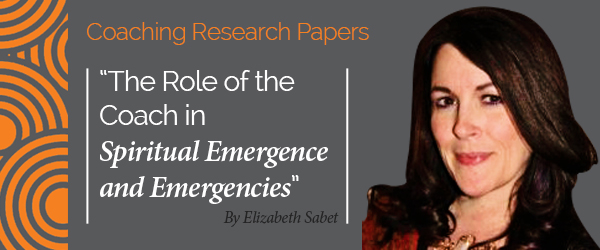Research Paper By Elizabeth Sabet
(Life Coaching, UNITED STATES)
This article will define Spiritual Emergence and Emergency, the need for spiritual and transformational healing life coaches to be trained specifically in Spiritual Emergence and Emergency, the risks to the coach and client, how to manage those risks, and how to help the client integrate the changes brought about by the experience(s) as they identify their need.
INTRODUCTION
Spiritual Emergence and Emergencies are growing in the number of reported cases globally. As more people become willing to share their experiences, more professionals have been willing to pay attention to this phenomenon and investigate how best to help experiencers integrate and transform from the effects of the experience(s).
Professionals interested working with this population help people build lives that honors their experience(s), and helps them live in the world with an expanded sense of Self in the 3D experience, in other words, help them develop the ability to walk in two worlds at the same time. Wise and courageous professionals have learned to utilize these experiences as life learning lessons and opportunities for deep healing and transformation and help the client lift the stigma sometimes associated with non-ordinary and non-local experiences.
While it is true there is more genuine interest and concern for this population than ever before there is still a major bias in the mental health industry against spiritual experiences being a normal and healthy process of the psyche. There were no diagnosis codes for Spiritual or Religious Problems in the APA (American Psychiatric Association) DSM-IV codes until 1994. And even today many people who have non-ordinary, non-local experiences are more likely to be diagnosed by mental health professionals (MHPs) with some form of mental illness such as Brief Psychotic Disorder, Schizophrenia, Schizophreniform, and other disorders than they are to be diagnosed as having Acute Phase Spiritual Emergency. MHPs who are aware of the difference are usually trained in Transpersonal Psychiatry or Phycology and/or have had specific training on differential diagnosis of psychosis and spiritual emergency but this is a very small percentage of the professional population.
Because many spiritual experiencers are afraid of going to mental health professionals and “getting medicated out of their experiences”, they are less likely to seek the help of a trained mental health professional to help them improve and change their lives. Many of these people seek help through spiritually oriented life coaches instead, when they can find them. This poses a challenge and potential threat to a coach’s practice as well as an opportunity to be a source of great help and integration for the client.
As a transformational coach with a rich history of my own spiritual experiences from childhood, I have been sought out by other experiencers to assist them in coming to a place of acceptance, understanding, and integration. In learning how to process and integrate my own experiences I have learned many lessons along the way, the most important lesson being to trust that the purpose and function of the experience, no matter how bizarre or scary, is to lead me into an integrated state of wholeness and well-being. This has served me well in being a coach to other experiencers. However, the maturation process has been and continues to be, long and full of potential risks. I hope to share some of the insights I have discovered in this article with other coaching professionals.
